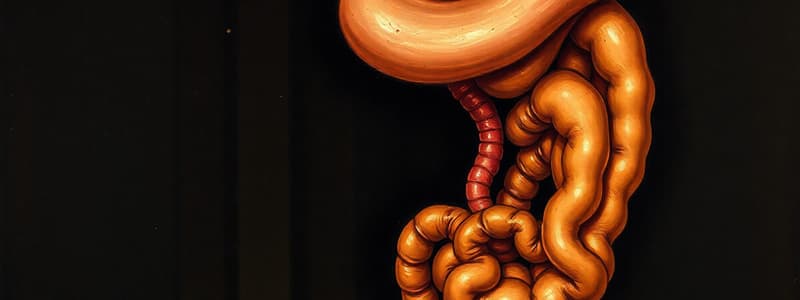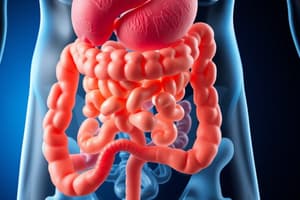Podcast
Questions and Answers
Which of the following is NOT considered a major metabolic waste product?
Which of the following is NOT considered a major metabolic waste product?
- Nitrogenous wastes
- Water
- Oxygen (correct)
- Carbon dioxide
The skin is one of the major organs involved in excretion.
The skin is one of the major organs involved in excretion.
True (A)
What process is responsible for the formation of urea?
What process is responsible for the formation of urea?
Breakdown of amino acids
The _______ is the largest single internal organ in the body.
The _______ is the largest single internal organ in the body.
Match the following organs to their primary excretory function:
Match the following organs to their primary excretory function:
Which metabolic waste is primarily produced during aerobic cellular respiration?
Which metabolic waste is primarily produced during aerobic cellular respiration?
Cirrhosis of the liver can result from long-term abuse of alcohol.
Cirrhosis of the liver can result from long-term abuse of alcohol.
The liver produces bile to _______ stomach acids and emulsify fats.
The liver produces bile to _______ stomach acids and emulsify fats.
What is the primary function of the ureters?
What is the primary function of the ureters?
The renal artery carries filtered blood from the kidneys back into circulation.
The renal artery carries filtered blood from the kidneys back into circulation.
What fluid is stored in the urinary bladder?
What fluid is stored in the urinary bladder?
The _____ is the tube that carries urine out of the body.
The _____ is the tube that carries urine out of the body.
Match the parts of the kidney to their functions:
Match the parts of the kidney to their functions:
What is the primary function of the glomerulus?
What is the primary function of the glomerulus?
The proximal tubule connects the Bowmanʼs capsule to the loop of Henle.
The proximal tubule connects the Bowmanʼs capsule to the loop of Henle.
How many nephrons are typically found in each kidney?
How many nephrons are typically found in each kidney?
The __________ duct leads from the medulla into the pelvis and is involved in urine formation.
The __________ duct leads from the medulla into the pelvis and is involved in urine formation.
Match the part of the nephron with its function:
Match the part of the nephron with its function:
Which part of the nephron primarily reabsorbs glucose and amino acids?
Which part of the nephron primarily reabsorbs glucose and amino acids?
Urine is formed in the proximal tubule of the nephron.
Urine is formed in the proximal tubule of the nephron.
Which part of the nephron extends into the medulla?
Which part of the nephron extends into the medulla?
What is a common symptom of a urinary tract infection (UTI)?
What is a common symptom of a urinary tract infection (UTI)?
Kidney stones are caused by low concentrations of salts and uric acid in the urine.
Kidney stones are caused by low concentrations of salts and uric acid in the urine.
What are two common causes of kidney infection?
What are two common causes of kidney infection?
Severe cases of urinary tract infections can also cause _______ and vomiting.
Severe cases of urinary tract infections can also cause _______ and vomiting.
Match the medical condition with its associated cause:
Match the medical condition with its associated cause:
What is a potential treatment for kidney stones if they do not pass on their own?
What is a potential treatment for kidney stones if they do not pass on their own?
What must patients do when experiencing kidney failure?
What must patients do when experiencing kidney failure?
The human body can function with only one kidney.
The human body can function with only one kidney.
What is a common cause of urinary tract infections (UTIs)?
What is a common cause of urinary tract infections (UTIs)?
Which treatment is commonly prescribed for urinary tract infections?
Which treatment is commonly prescribed for urinary tract infections?
What dietary change can help in preventing kidney stones?
What dietary change can help in preventing kidney stones?
How is kidney failure typically treated?
How is kidney failure typically treated?
What is a recommended dietary change for someone with one kidney?
What is a recommended dietary change for someone with one kidney?
What is the primary function of the excretory system?
What is the primary function of the excretory system?
How do the kidneys help regulate blood volume?
How do the kidneys help regulate blood volume?
What are the major functions of nephrons?
What are the major functions of nephrons?
In which part of the nephron does filtration primarily occur?
In which part of the nephron does filtration primarily occur?
What is the role of the collecting ducts in the nephron?
What is the role of the collecting ducts in the nephron?
Where does reabsorption primarily take place in the nephron?
Where does reabsorption primarily take place in the nephron?
How many nephrons are typically estimated to be in the human body?
How many nephrons are typically estimated to be in the human body?
Which organ is primarily responsible for blood detoxification?
Which organ is primarily responsible for blood detoxification?
Flashcards
Metabolic Waste
Metabolic Waste
Substances left over from metabolic processes that are either surplus or toxic to the organism and must be removed.
Excretion
Excretion
The process by which organisms remove metabolic wastes and excess substances from their cells.
Liver
Liver
The largest single internal organ in the body, responsible for detoxification, bile excretion, and urea formation.
Liver: Detoxification of Blood
Liver: Detoxification of Blood
Signup and view all the flashcards
Cirrhosis
Cirrhosis
Signup and view all the flashcards
Bile
Bile
Signup and view all the flashcards
Liver: Excretion of Bile
Liver: Excretion of Bile
Signup and view all the flashcards
Urea
Urea
Signup and view all the flashcards
What are ureters?
What are ureters?
Signup and view all the flashcards
What is the urinary bladder?
What is the urinary bladder?
Signup and view all the flashcards
What is the urethra?
What is the urethra?
Signup and view all the flashcards
What is a nephron?
What is a nephron?
Signup and view all the flashcards
What is the renal cortex?
What is the renal cortex?
Signup and view all the flashcards
What is the glomerulus?
What is the glomerulus?
Signup and view all the flashcards
What is Bowman's capsule?
What is Bowman's capsule?
Signup and view all the flashcards
What is the proximal tubule?
What is the proximal tubule?
Signup and view all the flashcards
What is the loop of Henle?
What is the loop of Henle?
Signup and view all the flashcards
What is the distal tubule?
What is the distal tubule?
Signup and view all the flashcards
What is the collecting duct?
What is the collecting duct?
Signup and view all the flashcards
What is filtration in the nephron?
What is filtration in the nephron?
Signup and view all the flashcards
Urinary Tract Infection (UTI)
Urinary Tract Infection (UTI)
Signup and view all the flashcards
Kidney Stones
Kidney Stones
Signup and view all the flashcards
Kidney Infection
Kidney Infection
Signup and view all the flashcards
Kidney Failure
Kidney Failure
Signup and view all the flashcards
Hemodialysis
Hemodialysis
Signup and view all the flashcards
Kidney Transplant
Kidney Transplant
Signup and view all the flashcards
Compensatory Hypertrophy
Compensatory Hypertrophy
Signup and view all the flashcards
Why are UTIs more common in women?
Why are UTIs more common in women?
Signup and view all the flashcards
What is the main function of the excretory system?
What is the main function of the excretory system?
Signup and view all the flashcards
Name some organs that are responsible for excretion.
Name some organs that are responsible for excretion.
Signup and view all the flashcards
How does the excretory system regulate blood volume?
How does the excretory system regulate blood volume?
Signup and view all the flashcards
What is the primary function of the kidneys?
What is the primary function of the kidneys?
Signup and view all the flashcards
Where are nephrons located?
Where are nephrons located?
Signup and view all the flashcards
How many nephrons are there in the human body?
How many nephrons are there in the human body?
Signup and view all the flashcards
What are the major parts of the nephron?
What are the major parts of the nephron?
Signup and view all the flashcards
Where does nephric filtrate come from?
Where does nephric filtrate come from?
Signup and view all the flashcards
What is a UTI?
What is a UTI?
Signup and view all the flashcards
What are kidney stones?
What are kidney stones?
Signup and view all the flashcards
What is kidney failure?
What is kidney failure?
Signup and view all the flashcards
What is hemodialysis?
What is hemodialysis?
Signup and view all the flashcards
How do you adjust your diet to support a single kidney?
How do you adjust your diet to support a single kidney?
Signup and view all the flashcards
Study Notes
Excretory System Overview
- The excretory system regulates heat, water, salt, acid-base concentrations, and metabolite concentrations.
- This system removes metabolic waste products that the body cannot use or that are toxic.
- Metabolic processes are chemical reactions that occur within living cells.
Major Metabolic Wastes
- Carbon dioxide: A byproduct of aerobic cellular respiration.
- Water: A byproduct of aerobic cellular respiration.
- Mineral salts: Various salts produced during chemical reactions within cells (metabolism); examples include sodium chloride and sodium sulfate.
- Nitrogenous wastes: The breakdown of amino acids produces ammonia, urea, and uric acid.
- Heat: Released during exothermic chemical reactions to maintain a constant body temperature.
Excretion
- Excretion is the process of removing metabolic wastes and excess substances from cells.
- Every cell produces wastes, including excess water, salts, carbon dioxide, and urea.
- Excretion helps maintain homeostasis by removing these wastes.
Organs of Excretion
- Skin and associated glands
- Lungs
- Kidneys: Part of the urinary system. They are major excretory organs, producing urine.
- Liver: Also a major excretory organ; performs important functions of detoxification, bile excretion, and urea formation, removing poisons, toxins, bacteria, or excess hormones from the blood.
Skin
- Skin functions include protection from pathogens (first line of defense of the immune system), protection against water loss, and temperature regulation.
Lungs
- Lungs remove carbon dioxide and water vapor from the body.
Liver
-
The liver is the largest internal organ.
-
It has three main roles:
- Detoxification of blood
- Excretion of bile
- Formation of urea
-
Detoxification involves filtering out poisons, toxins, bacteria, and excess hormones from the blood; altering them into less toxic/inactive forms via enzymes before releasing them back into circulation to be transferred to the kidneys.
-
Most of the bile salts are reabsorbed into the blood at the end of the small intestine to be reused and filtered by the liver; the rest is excreted in feces. If the liver function is impaired, bilirubin (a component of bile) is reabsorbed into the blood, leading to possible health issues, such as jaundice.
-
Bile helps neutralize stomach acids, emulsify fats in the small intestine; produced, stored in the gallbladder, and released into the small intestine when needed. Bile consists of cholesterol, bilirubin (from hemoglobin breakdown), and bile salts (mineral salts).
-
The liver forms urea from ammonia, the toxic byproduct of breaking down amino acids; urea is released into the bloodstream and is filtered out by the kidneys.
-
Long-term abuse of poisons like alcohol can cause cirrhosis, where liver tissues overgrow to restrict blood flow within the organ. This can lead to liver failure.
Studying That Suits You
Use AI to generate personalized quizzes and flashcards to suit your learning preferences.




